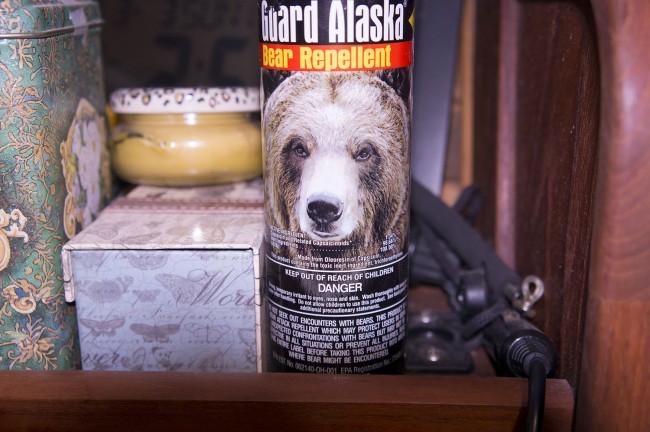Thursday February 21, 2013
It’s my dirty dinghy, and you can’t have it!
A few weeks ago I was walking by the boat and realized how nice and shiny the hull was. Â It had just gotten a good buffing and polishing, but what I really took notice of was the stark contrast of our dirty and dingy dinghy hanging off the davits on the back. Â This dinghy was brand new to us just a year and a half ago, and had been in pristine condition when we started our summer 2012 cruising season. Â Now it’s covered with rub burns from being tied up extra tight during (short) ocean passages and just general dirt and gunk that hadn’t been cleaned up. Â Both our outboard engines are not looking much better, both scraped and scuffed to hell. Â And surprisingly, that’s not far off of how we want all of them to look.
The reason for this, is there are unfortunately going to be thieves in the places we’re traveling.  And thieves tend to go for the bright/shiny/new objects that they think they can get the most money from when they’re going to re-sell.  Without getting into too much detail for any potential thieves reading this (not completely impossible),  a lot of objects we own that they like to steal, such as outboards and dinghy, are in a condition that would make them desirable, but they definitely don’t look it.  And although ours are probably not the first items in an anchorage they’d pounce on, there’s still a chance they could be taken.  So this brings us to the question, what can you do to keep thieves from taking what’s yours?  A simple answer would be:  Make it hard for them.  Make them have to work for it, and therefore not worth their time.
Even if our items aren’t as shiny and pretty as the people next to us, most crimes are a crime of opportunity, so we’ve even taken extra precautions besides not having the best eye candy.  Let’s start with the outboards.  We have two, a 3.3 hp and 9.9 hp, but they look old and run down and about to fall apart at any moment.  Their covers are dirty and scratched and beat up like no other.  Back in Annapolis when we were anchored near our friends Kim and Scott on Anthyllide, they offered us a beat up cover for ours, not knowing it already looked like crap, because they said the last thing you want down in the Caribbean is a shiny new outboard.  But even if a thief saw our beat up crappy looking outboard and thought “Hmmmm, I may not be able to sell that for much, but I could still give it to my second cousin’s niece’s brother…” we’re still going to make it hard for them to do so.  Anywhere we go, even in Safe City, USA, everything gets locked up.  The dinghy, the outboard, all of it.  When we were in Detroit, we’d even run the chain through our life vests to keep them from being taken.
So that takes care of when you go to shore, but what about back at your boat? Â Not that we’ve been any further than the US yet, but we’ve heard of far to many stories of dinghies in the Caribbean that are only cleated off to their boat overnight, and by morning they’re gone. Â What we’ve learned from this, is to get your dinghy out of the water. Â Every. Night. Â There are two main ways that most cruisers can do this. Â One is by having davits off the stern of your boat, which will connect to the front and back of your dinghy, and by using a pulley system, lift it out of and suspend it over the water. Â The other way is to use a halyard to pull it out of the water near the foredeck of your boat, and either leave it suspended over your deck, or lower it and secure it to your deck. Â If you want to take even more precautions than that, you can still lock it to your boat after following one of these steps. Â It may seem like a lot of work, but while out cruising your dinghy is your car, and you can literally be left stranded without it.
Having your outboard or dinghy taken is the most common practice of thievery any cruiser will encounter, but what if worse comes to worst and someone tries to board your boat? Â The chances of this happening really are incredibly low, but it still deserves attention. Â As I said before, I’m not going to write an instruction manual of all the obstacles you would need to overcome to get into my boat, but let me just say that we are locked down, inside and out. Â Most cruiser’s will take the precaution to lock down their boat while they’re away from it, but what about while you’re inside?, sleeping through the night. Â Sure, you might have a can of Mace (or bear spray) next to your bed, or even an arm knife that your previous boss gave you, but you may also find yourself with not enough time to react to get to it. Â There might be a gun at your head before you realize anyone has even boarded. Â Think you still have time to use your Mace then? Â Think again. Â To make sure that never happens to us we’ve outfitted our boat with inside locks on the companionway, hatches, and even have a motion alarm. Â I’m not saying it’s impossible for anyone to try and board our boat, but before they get inside, we’ll know about it. Â And that will give us plenty of time to jump on the radio, and pull out our arsenal of Mace, knives, and flare guns.* Â Wanna try messing with us now? Â I think not. Â Or maybe I’ll get further if I just ask nicely. Â Can you please move on to the next boat? Â They have much better stuff than we do anyway.
I spy a little bear spray in the eye.
*Mom, this is not meant to scare you (or any other family, friends, and cruiser’s out there). Â We are aware of the dangers and keep ourselves very protected. Â The chance of a breaking and entering on our boat is close to none. Â I actually fear for you more while you’re walking to your car in a deserted lot at night.




Another benefit of raising your dinghy up out of the water every night (we learned this the hard way our first winter cruising in salty seas) is that it will save you many, many hours of cleaning your dinghy bottom of the barnacles and organic material that grow oh-so-quickly when your dinghy is sitting in the water full time.
Jo, you’re absolutely right. Even if we didn’t have to worry about the dinghy being stolen, I’d rather lift it out of the water each night than have to clean off barnacles and other nasty things from the bottom.
If you do happen to lose a dinghy, which I have, what do you do?
Tom, are we talking stolen or just having it float away? 🙂 Cause if you remember right, I’m pretty good at retrieving them. But if it is stolen, we’ll just hope there’s another boater that can cart us to and from shore a few times until we bought a new one.
Apparently, dinghies are harder to sell than outboards down island. Outboards are useful to fishermen and on utility boats. Deflatables are really only useful to people like us, who need little ferries.
So make sure your dinghies is clearly marked. It may likely be found floating free once the thieves have looted it. Small consolation, but better than nothing.